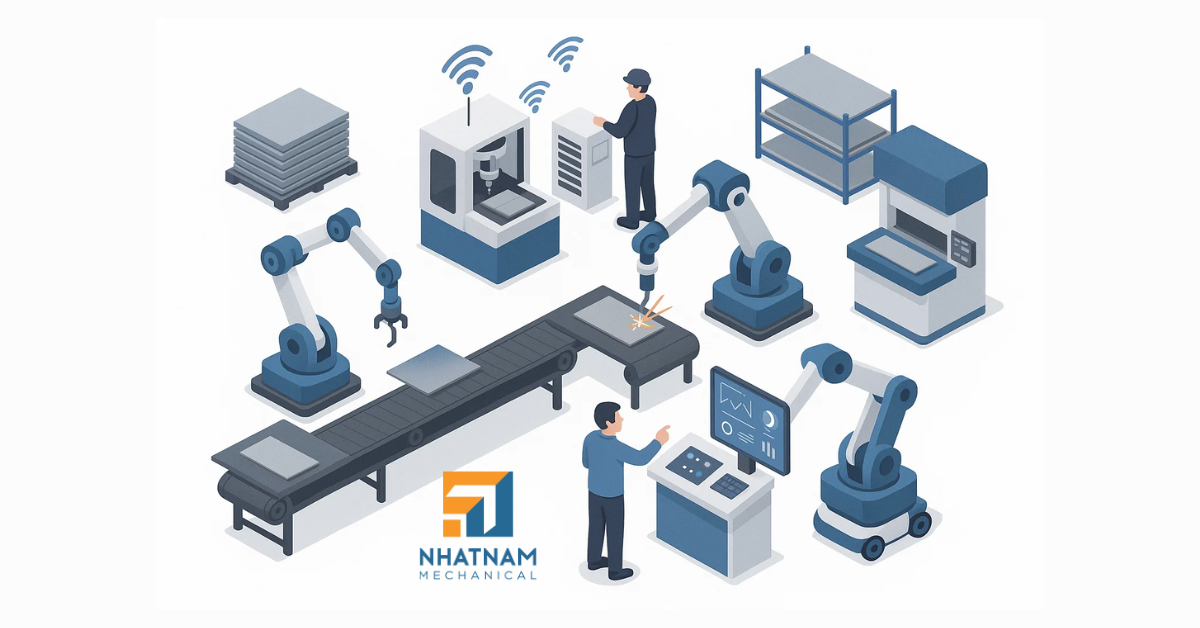
In recent years, the rapid development of digital technology has pushed the sheet metal fabrication industry into a completely new era. Modern factories no longer rely solely on traditional CNC machines—they now integrate:
- IoT-connected systems
- Automated robotics
- Real-time data monitoring
- Artificial Intelligence (AI)
- Smart production management platforms
Together, these technologies create a Smart Factory—a manufacturing environment where machines can “communicate,” self-optimize, and help technicians make faster, more accurate decisions.
The impact is clear: higher productivity, consistent quality, reduced operating costs, and significantly fewer production errors.
1. What Is a Smart Factory in the Sheet Metal Industry?
A Smart Factory in precision sheet metal fabrication is a fully connected ecosystem where:
- Laser cutters, CNC press brakes, punching machines, and welding robots are linked through IoT
- Data is captured and displayed in real time
- AI analyzes performance trends and predicts maintenance needs
- The entire workflow is automated from blank feeding → cutting → bending → welding → inspection
Humans do not disappear—they move from manual labor to monitoring, optimizing, and intelligently operating the system.

2. Core Industry 4.0 Technologies in Sheet Metal Fabrication
2.1. IoT & Real-Time Data Monitoring
Sensors installed on CNC machines continuously collect:
- Laser cutting head temperature
- Press brake load
- Machine vibration and stability
- Uptime and downtime
This real-time data enables technicians to:
- Identify which machines are running efficiently
- Detect issues before they cause failures
- Track production progress anytime, anywhere
2.2. Robotics & Process Automation
In modern sheet metal factories:
- Robots load workpieces into laser cutters
- Automated stackers collect sheets after cutting
- MIG/TIG welding robots deliver consistent, high-precision welds
- AGVs/AMRs transport components between stages
These systems reduce reliance on heavy manual labor and significantly increase throughput.

2.3. Artificial Intelligence & Machine Learning
AI plays a transformative role by:
- Optimizing cutting and bending parameters
- Predicting machine maintenance (predictive maintenance)
- Reducing scrap with AI-powered nesting algorithms
- Automatically adjusting bending force based on material type
2.4. MES/ERP Smart Management Systems
A Smart Factory connects the entire production lifecycle:
Order → Design → Fabrication → Inspection → Packaging → Shipping
This integration allows businesses to:
- Track the status of every part in production
- Maintain accurate inventory levels
- Evaluate machine and personnel performance
- Store complete production records for full traceability
3. Key Benefits of Smart Factory Transformation
3.1. Higher Precision and Stability
Smart systems increase accuracy through:
- Sensors monitoring vibration, force, and temperature
- Automatic parameter adjustments when abnormalities occur
- Saved processing data to avoid repeated errors
This ensures consistent quality—even when operators or shifts change.
3.2. Faster Production Speed
Smart Factories eliminate delays between stages:
- Robots pick and place parts immediately after cutting
- Job scheduling automatically adapts to machine status
- Production flow becomes smoother and more stable
Businesses can handle more orders without increasing labor.

3.3. Lower Operating Costs
Automation and data bring cost savings by:
- Reducing material waste with optimized nesting
- Minimizing labor required for repetitive machine tasks
- Monitoring and optimizing energy usage
This lowers the cost per unit and enhances competitiveness.
3.4. Transparent Quality Control
Every part processed in a Smart Factory is linked to digital data such as:
- Which machine produced it
- Exact parameters used
- Total processing time
If errors occur, technicians can trace the root cause within seconds.
3.5. Reduced Machine Downtime
Smart systems detect early signs of failure, such as:
- Wear on critical components
- Overheating in laser cutting heads
- Misalignment in punching dies
Predictive maintenance prevents unexpected downtime and keeps orders on schedule.
4. Smart Factory Transition Roadmap for Sheet Metal Businesses
Not every business can transform immediately. A practical roadmap includes:
4.1. Start with Digital Data Collection
Begin with simple steps:
- Attach sensors to critical machines
- Use software to automatically record job progress
- Display machine data on dashboards
This shifts the factory away from manual recording toward accurate, reliable data.
4.2. Automate High-Impact Processes
Businesses should prioritize automation where it brings the highest return:
- Automated laser cutting
- Pick-and-place robots for CNC press brakes
- Welding robots for repetitive or high-precision products
This boosts speed and reduces human error.

4.3. Deploying an MES/ERP System
Once data is digitized, companies can:
- Connect orders → planning → production → delivery
- Minimize errors from manual progress tracking
- Automatically calculate machine and personnel productivity
- Improve transparency across the entire shop floor
Deploying an MES/ERP system is a major step toward a fully data-driven, organized factory.
4.4. Personnel Training
People remain at the center of every Smart Factory. To maximize efficiency, businesses must:
- Train employees to operate automated equipment
- Improve data-reading and data-analysis skills
- Help staff understand digital workflows
- Develop a mindset that embraces continuous improvement
Once employees adapt to the new model, overall performance and product quality increase significantly.
5. Conclusion
Industry 4.0 is unlocking tremendous opportunities for the sheet metal fabrication industry. Speed, accuracy, quality, and cost-efficiency are all being elevated to new levels through smart technology. Companies that transition early to the Smart Factory model will gain a significant competitive advantage—especially as customer expectations rise and global manufacturing shifts toward leaner, faster, and smarter production systems. A successful transformation doesn’t require changing everything at once. With the right roadmap—starting from digital data → automation → MES/ERP integration → employee training—any sheet metal manufacturer can modernize operations, reduce risks, and deliver world-class products with confidence.

Nhat Nam Mechanical is a specialist in precision sheet metal fabrication with a modern machinery system that meets strict requirements for accuracy and quality. We apply advanced technologies such as laser cutting, CNC bending, and robotic welding to ensure products meet high standards, maintain consistency, and are delivered on schedule. With many years of industry experience, Nhat Nam is confident in providing optimal solutions for customers across all manufacturing sectors.
